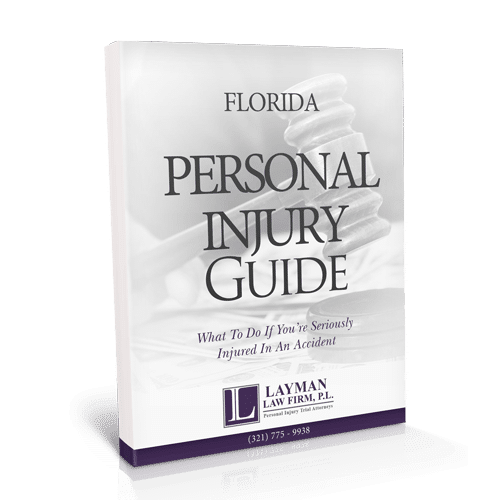Melbourne Bodily Injury Lawyers
The victim of a bodily injury often experiences profound, even fatal, physical injuries as well as emotional trauma and financial hardship. Often, a bodily injury is caused entirely or partially by the negligent or wrongful conduct of another party. When that is the case, a victim may be entitled to compensation from the at-fault party.
The experienced Melbourne bodily injury lawyers at Layman Law Firm, P.L. are committed to helping bodily injury victims identify all responsible parties and to holding those parties accountable. Our extensive experience and considerable resources allow us to aggressively pursue compensation for physical and emotional damage caused by a bodily injury.
What Is a Bodily Injury?
To determine if you have a legally actionable bodily injury claim, you must first have a clear understanding of what the term “bodily injury” means. Although the term “bodily injury” is a commonly used term and one that you likely believe you can define, it is important to know how the term is officially defined.
We can start with a simple enough definition provided by the Merriam-Webster Dictionary which defines a “bodily injury” as “any damage to a person’s physical condition including pain or illness.” What we really need to know, however, is how the law defines a bodily injury. For that definition, we at the United States Code where the terms “serious bodily injury” and “bodily injury” are defined at 18 USC § 1365(h) as follows
- The term “serious bodily injury” means bodily injury which involves any of the following:
- a substantial risk of death
- extreme physical pain
- protracted and obvious disfigurement
- protracted loss or impairment of the function of a bodily member, organ, or mental faculty
- The term “bodily injury” means any of the following:
- cut, abrasion, bruise, burn, or disfigurement
- physical pain
- illness
- impairment of the function of a bodily member, organ, or mental faculty
- any other injury to the body, no matter how temporary
Florida law does not specifically define “bodily injury” but Florida Statute 316.027 defines “serious bodily injury” in the context of a motor vehicle accident as “an injury to a person, including the driver, which consists of a physical condition that creates a substantial risk of death, serious personal disfigurement, or protracted loss or impairment of the function of a bodily member or organ.”
Examples of bodily injuries that often result in an actionable personal injury lawsuit include:
- Traumatic brain injuries
- Broken bones/amputations
- Head & eye injuries
- Neck & back injuries
- Paraplegic injuries
Is a Personal Injury and a Bodily Injury the Same Thing?
The terms “personal injury” and “bodily injury” are frequently used interchangeably when, in fact, they are not the same thing. A bodily injury may establish the basis for a personal injury lawsuit; however, not all bodily injuries are personal injuries. Likewise, not all personal injury lawsuits involve bodily injury. While that may sound like a circular logic puzzle, the distinction becomes clearer if you understand the legal definition of “personal injury.”
Torts is the area of the law that allows injured or wronged victims to recover monetary damages through a civil lawsuit. A personal injury is a type of tort which is broadly defined as “every variety of injury to a person’s body, emotions, or reputation, as contradistinguished from injury to property rights.” Examples of personal injury claims that do not involve a bodily injury include defamation and intentional infliction of emotional distress. In most cases, however, a personal injury lawsuit does involve bodily injury and may also involve emotional trauma.
At the same time, a bodily injury does not always give rise to a valid personal injury lawsuit. For a bodily injury to serve as the basis for a personal injury lawsuit, another party’s negligent or wrongful conduct must have caused or contributed to the injury. Negligence requires the injured victim to prove four things:
- That the defendant owed a duty of care to the victim
- That the defendant breached the duty of care
- That the breach of duty caused or contributed to the victim’s injuries
- That the victim suffered damages
“Wrongful” conduct, in the context of a personal injury lawsuit, includes liability based on the intentional conduct of the defendant or on strict liability. Intentional conduct includes things such as physical assault that results in injuries to the victim. While a physical assault may result in criminal charges against the defendant, that conduct may also serve as the basis for a civil personal injury lawsuit. Strict liability imposes liability regardless of the intent or mental state of the defendant. For instance, anyone involved in the “stream of commerce” may be held liable for injuries caused by a defective product without proving that the party was negligent or intended to harm the injured party. Likewise, some states impose strict liability for dog bites that cause injury even if the owner tried to prevent the dog from causing harm.
What Are Common Causes of Bodily Injuries?
An infinite number of fact scenarios could result in a victim suffering bodily injuries that may be compensable through a personal injury lawsuit. Some of the most common ways in which a bodily injury occurs include:
- Car accidents
- Slip and fall accidents
- Swimming pool accidents
- Dog bites/attacks
- Boating accidents
- Pedestrian accidents
Am I Entitled to Compensation for My Melbourne Bodily Injury?
If you suffered a bodily injury that qualifies as a personal injury, meaning that the negligent or wrongful conduct of another party caused or contributed to the injury, you may be entitled to compensation from the at-fault party or parties. The same is true if you are a surviving family member of someone who died because of a bodily injury. Compensation may include both economic and non-economic damages. Economic damages represent the direct, easily identifiable costs related to a bodily injury, such as:
- Medical expenses, including doctor, hospital, and therapist expenses
- Rehabilitation, in-home care, and long-term care costs
- Lost income or loss of earning capacity
- Specialized medical equipment
Non-economic damages represent the subjective and difficult-to-quantify expenses related to a bodily injury and may include:
- Pain and suffering
- Emotional distress
- Loss of enjoyment of life
- Disfigurement
- Mental anguish
- Loss of consortium
As the surviving spouse or child of a victim who suffered a fatal bodily injury, you may be entitled to compensation for the loss of the companionship, care, and support that was provided by your spouse or parent prior to his or her death by pursuing a wrongful death lawsuit.
Contact the Experienced Melbourne Bodily Injury Lawyers at Layman Law Firm, P.L.
If you suffered a bodily injury, or you lost a family member because of a bodily injury, and you believe you may have the basis for a personal injury lawsuit, contact the experienced and compassionate Melbourne bodily injury lawyers at Layman Law Firm, P.L. to discuss your legal options. Contact the team today for your free initial consultation by calling 321-773-2111 or by filling out our convenient Intake Evaluation Form online.






